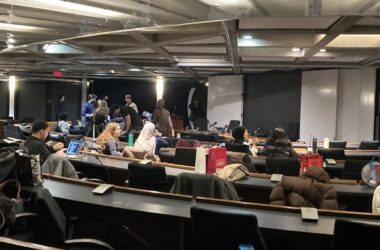Between Nov. 19 and 23, the McGill Social Work Students’ Association (SWSA) went on strike to protest the faculty’s compulsory internship requirement which students do not receive compensation for. Among the protesters was Hannah Miller, U2 Social Work and the equity coordinator for the SWSA. Though they played a crucial role in the past week on campus, Miller’s activism in the faculty began long before the recent organized protest. For the last week, Miller has been partaking in teach-outs, blocking access to classes as part of the picket line, and engaging in conversations with faculty administrators. These efforts are meant to encourage the administration to reform the faculty’s curriculum and ensure that student demands are heard.
“Our intention is not to block people from learning or to create a hostile learning environment,” Miller said. “We don’t want to not go to class. We don’t have the option. Certain people can’t afford not getting paid.”
For their internship this year, Miller has worked at Action Santé Travesti(e)s et Transsexuel(le)s du Québec (ASTT(e)Q), which supports trans people around the city through peer support, education, harm reduction, and community empowerment initiatives. Despite the vital work that Miller and their fellow McGill students are providing to the Montreal community, they are often not compensated by their employers.
While many internships in fields such as computer science are paid, internships in the development and care industries, such as education and social work, frequently lack remuneration. Additionally, the labour inequality that McGill’s social work students are aiming to dismantle reflects gendered bias. Female-identifying students who carry out internships are only paid 17 per cent of the time while 45 per cent of their male-identifying counterparts are paid for equal labour.
Additionally, as interns, many of McGill’s social work students take on work positions without access to the insurance or social benefits offered to long-term employees. Miller explained that, in addition to protesting unequal compensation, social work interns are also protesting this discrepancy in provincial labour laws.
“We don’t have any protections,” Miller said. “If you’re facing sexual harassment, if you get pregnant, if you get injured, you have no protection because your labour is not recognized.”
In many ways, Miller prefers working at their internship over attending lectures. At work, Miller is immersed in an inclusive and accepting space—a culture that they do not get to enjoy as often on campus. Miller explained that they feel the faculty’s curriculum is outdated and can make them feel unwelcome.
“[The social work curriculum] lacks intersectionality in all its forms,” Miller said. “[Through] most of the materials and our professors, we learn a very straight, cis-male perspective without recognizing the harm of that [….] There are gender development theorists that say that if you don’t know if you’re male or female at a certain age, there is something developmentally wrong with you. When this is being taught in class, and I’m sitting there, it’s basically telling me there’s something wrong with me.”
After advocating for a more inclusive curriculum, Miller faced resistance from a number of faculty members. Despite this hesitance, Miller feels like it’s the faculty’s responsibility to correct the curriculum’s flaws and to make it more inclusive of current and in upcoming students.
“I feel like if I don’t say something, then nothing will be said, and we don’t have these conversations,” Miller said. “If we want to be effective social workers, we need to be able to have a well-rounded and open understanding of different lived experiences.”
Along with Miller’s full course load, unpaid internship, and many other commitments throughout the school year, they are also a single parent. Hannah prioritizes their child over their grades and other coursework, leaving them with little free time to seek out an alternative source of income. Ultimately, in exchange for the time they have sacrificed for their degree, Miller believes they deserve fair treatment from the university.
“I came into this program, and I knew there was going to be unpaid labour,” Miller said. “I didn’t know how heavy that was going to be on me, both physically and emotionally. My goal for the strike is to have my labour recognized as labour.”







